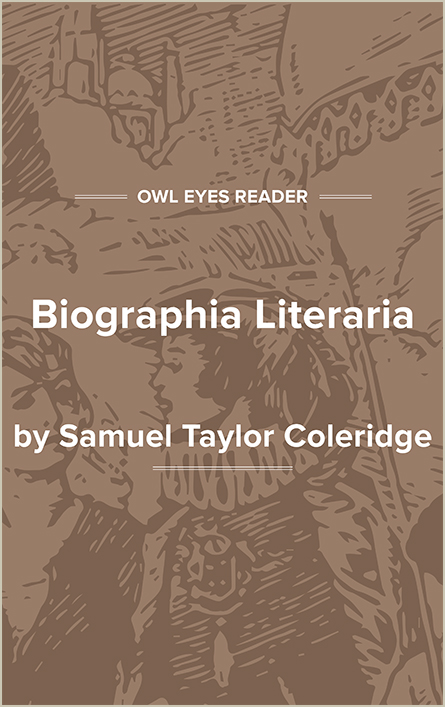Study Guide
Summary
Samuel Taylor Coleridge’s Biographia Literaria begins as an account of the major influences on the development of the author’s philosophy and literary technique, but the total effect of the work is considerably less coherent than this plan would indicate. As he progresses, Coleridge apparently alters his purpose, and he discusses at considerable length intellectual problems of special interest to him and gives some of his standards of literary criticism, with comments on specific works. In his opening paragraph, he speaks of his work as “miscellaneous reflections,” and such a description seems appropriate.
The loose, rambling structure of the Biographia Literaria accords well with the picture of Coleridge that has been handed down: that of a man with great intellectual and poetic gifts who lacked the self-discipline to produce the works of which he seemed capable. Charles Lamb and William Hazlitt both characterized him as an indefatigable and fascinating talker, full of ideas; this trait, too, plays its part in the creation of the Biographia Literaria, which is, in essence, a long conversation ranging widely over the worlds of poetry, drama, philosophy, and psychology. The lack of a tight organizational plan in no way prevents the book from being both readable and profound in its content; Coleridge’s comments on the nature of the poetic imagination have never been surpassed, and his critique of William Wordsworth’s work is still perhaps the most balanced and judicious assessment available, a model for all scholars who seek to form general views on the basis of close examination of individual texts.
In the opening chapter, Coleridge pays tribute to his most influential teacher, the Reverend James Bowyer of Christ’s Hospital, who insisted that his students learn to think logically and use language precisely, in poetry as well as prose. Coleridge also discusses the poetry he preferred in the years when his literary tastes were being formed; he turned toward the “pre-Romantic” lyrics of minor writers rather than to the terse, epigrammatic intellectual poems of the best-known of the eighteenth century literary men, Alexander Pope and his followers. At an early stage, Coleridge developed sound critical principles, looking for works that gained in power through rereading and for words that seemed to express ideas better than any phrases substituted for them could. He quickly learned to distinguish between the virtues of works of original ideas and the faults of those that made their effect through novel phraseology. He confesses, however, that his critical judgment is better than his creative talent: His own early poems, though he thought highly of them when he wrote them, leave much to be desired.
The harshness of the critics of his time is a theme that recurs throughout Coleridge’s biography. In his second chapter, he ponders the tendency of the public to side with the critics rather than with the poets, who are considered to be strange, irritable, even mad. The greatest writers—Geoffrey Chaucer, William Shakespeare, Edmund Spenser, and John Milton—seem to him unusually well balanced, and he suggests that the popular heresy results from the frustrations of the second-rate writer who pursues fame without real talent. These general comments are closely linked to Coleridge’s sense of outrage at the vituperative attacks on him that issued regularly from the pages of the popular reviews, partly as a result of his association with Wordsworth and Robert Southey. The three poets were accused of trying to revolutionize, to vulgarize, poetry; they were avowedly interested in freeing poetry from the limitations of the eighteenth century poetic tradition. Coleridge denies that they deserved the abuses hurled at them.
After commenting on the works of Wordsworth and Southey, Coleridge turns to a number of philosophical problems that fascinate him, among them questions of perception, sensation, and the human thought processes....
(The entire page is 1,691 words.)
Owl Eyes subscribers get unlimited access to our expert annotations, analyses, and study guides on your favorite texts. Master the classics for less than $5/month!

